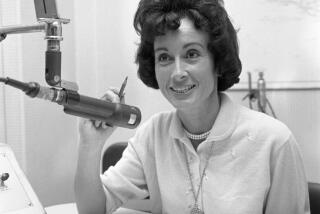Education Pioneer Sowed Seeds of Cooperation
- Share via
SAN FRANCISCO — Almost 60 years ago, Katharine Whiteside Taylor saw herself as an inexperienced, curious and concerned mother. Others, however, viewed her as a radical pioneer when she founded what has become the oldest continuously operating parents’ cooperative preschool in the country.
It started simply, with a social club of about 25 wives of professors at the University of California, Berkeley. Most were young mothers who found themselves asking questions about how children grow and learn.
The club began inviting experts to speak on those subjects and decided to start a preschool that would teach parents along with their children.
“You have to have some techniques and skill and information,” Taylor said. “Here you suddenly had the most important job you have ever had--and you had no training.”
That may not sound radical in 1986. But in 1927 it raised more than a few eyebrows, especially for more traditional mothers, Taylor said in an interview at her San Francisco home.
“We were pioneering in that we were taking kids seriously. It just wasn’t something you studied unless you were going to be a teacher,” said Taylor, who then had a bachelor’s degree in English and was married to an economics professor.
“We decided mothers needed to know how to raise children, that it wasn’t something you just automatically knew. It was a scientific thing too,” said the 88-year-old mother of three and grandmother of seven.
She and fellow club members scoured Berkeley for a suitable location. They found an old farm with a barn and property that covered a whole block.
Taylor went ahead with the Children’s Community Center, despite the bewildered people who greeted the news by shaking their heads, and despite the woman next door. “I remember her saying, ‘I spent the better part of my life raising children, and I’m not going to let anybody else get out of it,’ ” Taylor recalled with a laugh. It took two months of daily visits to wear down her resistance, she said.
But she admitted that her 1-year-old had a difficult time adjusting to suddenly spending his day at school.
‘They Had 20 Mothers’
“My own little boy just cried the first day, and every time he saw Mama he had to come and have a hug,” Taylor said. “But after they were there awhile, I think they felt they had 20 mothers instead of one.”
For a fee of $12 a month, parents brought children ages 2 to 5 to the school from 9 a.m. to 4 p.m., five days a week.
“We thought it was awfully good for them to have lunch together; that was part of the socialization,” Taylor said.
Another key to the program was parental participation: helping teachers and observing children and adults interact one day a week.
“It was a learning experience in cooperation--which is what I think the world needs more than anything else,” she said.
The cooperative nursery school concept spread.
“It began to take fire in California,” said Taylor, who worked as preschool director for two years, took over the parent education program and started lecturing around the world about the school and how to start one.
Taylor said similar programs were tried at Vassar and the University of Chicago around 1916 but didn’t last. The Berkeley project may have had easier going because kindergartens had just started, although they weren’t commonplace. Also, the university had just started the Institute of Child Welfare.
Taylor has not lost her interest in child development. She’s the author of a book on children and parents, in its third edition. She founded Cooperative Preschools International in the United States and Canada and started the Whiteside Taylor Institute for Childhood Cooperative Education in Montreal.
More to Read
Sign up for Essential California
The most important California stories and recommendations in your inbox every morning.
You may occasionally receive promotional content from the Los Angeles Times.













